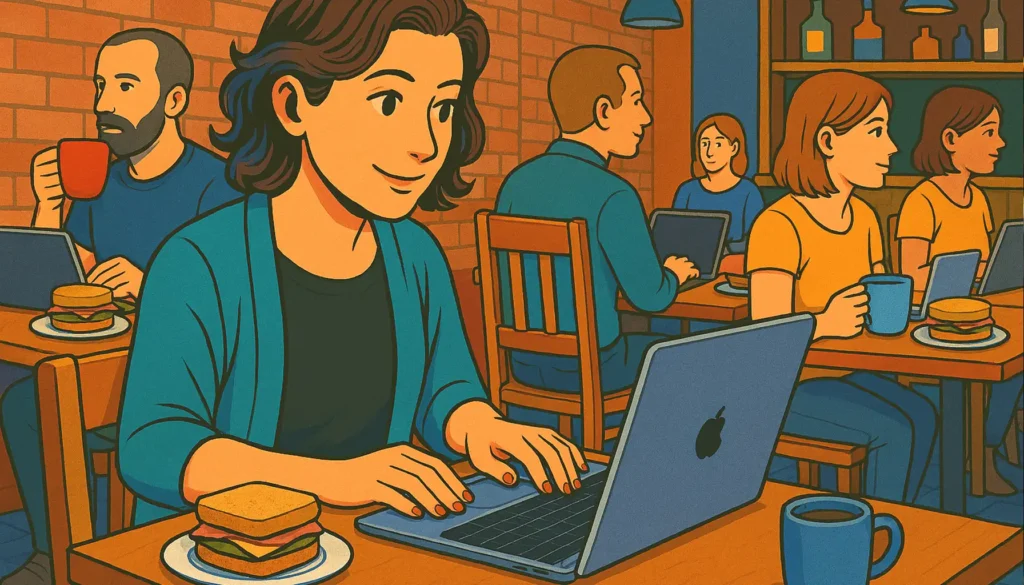Pub-desking is the practice of using pubs as informal co-working spaces during daytime hours. It’s a creative twist on remote work that turns quiet pub venues into productive environments for freelancers, entrepreneurs, and remote employees.
Here’s how it works:
- 🪑 Workspace access: Pubs offer tables, Wi-Fi, and power outlets—often with a dedicated area for workers.
- ☕ Day passes: Many venues provide packages that include unlimited hot drinks, lunch, and sometimes snacks or soft drinks.
- 💻 Flexible hours: Workers can book a few hours or spend the whole day, typically Monday to Friday.
- 🤝 Community vibe: Unlike isolated home offices, pub-desking encourages casual networking and social interaction.
Pub-desking is becoming increasingly popular here in the UK, where pubs are central to community life and often underused during daytime hours. For publicans, it’s a way to generate revenue and footfall during quiet periods. For workers, it’s a refreshing alternative to home or traditional co-working spaces—offering comfort, character, and a touch of hospitality.
Pub-desking offers a refreshing alternative to traditional workspaces, blending productivity with community and comfort. It’s a win-win for remote workers and publicans alike.
In the wake of remote work becoming a permanent fixture for many professionals, the concept of pub-desking—using pubs as co-working spaces—has emerged as a creative and community-driven solution. This trend is gaining traction across the UK, transforming underutilized daytime pub spaces into vibrant hubs of productivity and connection.
One of the most compelling benefits of pub-desking is the change of scenery. Working from home can become monotonous, especially for those without dedicated office space. Pubs offer a warm, characterful environment that breaks the routine and stimulates creativity. From cozy corners to sunlit beer gardens, a pub can provide a refreshing backdrop for focused work or collaborative meetings.
Affordability is another major draw. Many pubs offer day passes starting from £10–£20, which typically include unlimited Wi-Fi, bottomless hot drinks, and a meal. For example, the Bull Hotel in Olney provides a two-course lunch and unlimited tea and coffee for just £20 a day. Compared to traditional co-working spaces, this is a budget-friendly option that doesn’t skimp on comfort or amenities.
Pub-desking also fosters community and networking. Unlike isolated home offices, pubs bring together freelancers, entrepreneurs, and remote employees in a relaxed setting. This creates opportunities for spontaneous conversations, idea-sharing, and even new collaborations. It’s not just about working—it’s about connecting.
For publicans, pub-desking is a smart business move. Daytime hours are typically quiet in pubs, especially on weekdays. By welcoming remote workers, pubs can generate steady revenue during off-peak times. Packages that include food and drink encourage spending, while the presence of workers adds a lively atmosphere that can attract more customers.
Flexibility is another key advantage. Pub desks are usually available Monday to Friday, with booking systems that allow users to reserve a spot for a few hours or the whole day. Some venues, like Social Pub & Kitchen, offer tailored packages with plug socket access, lunch, and unlimited drinks, making it easy to settle in and stay productive.
Mental well-being also gets a boost. The social ambiance of a pub, combined with the chance to step outside the home, can alleviate feelings of isolation and burnout. Whether it’s chatting with staff or enjoying a pint after work, pub-desking adds a human touch to the remote work experience.
In essence, pub-desking reimagines the pub as more than just a place for leisure—it becomes a dynamic, community-centered workspace. As remote work continues to evolve, this trend offers a compelling blend of productivity, affordability, and social connection that benefits both workers and the hospitality industry.



